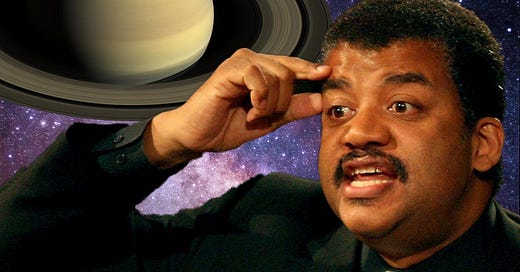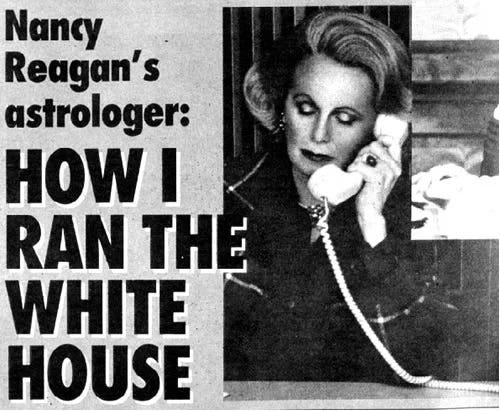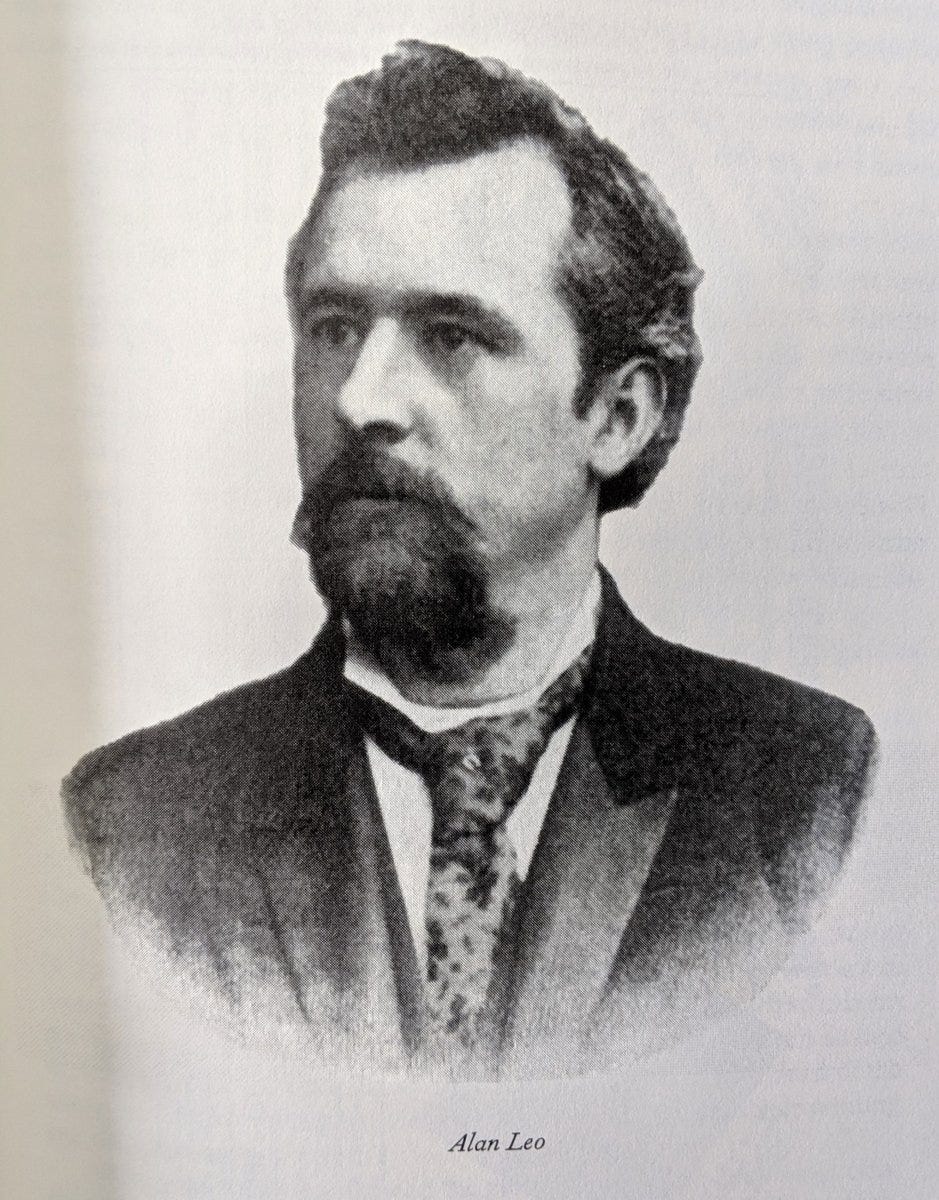Sorry skeptics: the future is astrological
Planetary cycles tell us the revival of astrology is only just beginning
Imagine a world in which news bulletins begin by describing the astrological transits of the moment. Treatment by holistic health practitioners who take astrological factors into account is the norm, not the exception. The academic study of history is inseparable from the study of planetary cycles. Analysis of candidates’ charts is a mainstay of media election coverage. We find love with apps using AI that suck up astrological data, relationship statistics and our preferences to find the perfect partner. In other words, imagine an astrological future.
What I just described may be Neil deGrasse Tyson’s worst nightmare. But as unlikely as it might seem right now, I believe something like this is what’s coming. My reasons for believing that are not a naïve conviction that we’re heading into a gloriously spiritual New Age, but a dispassionate reading of astrological symbolism, cycles and history. In this article I’m going to show how several planetary cycles promise us that astrological future. It’s not an argument that will persuade our friend Neil, but I hope astro-pilled readers will find it compelling.
On a recent episode of The Astrology Podcast, host Chris Brennan and his guest Rick Levine discussed the future trajectory of the celestial art. Chris and Rick noted that astrology is exponentially more popular today than it has been in decades—and considered whether that popularity is likely to continue to grow.
As mentioned on the podcast, the presence of Neptune in Pisces points towards astrology’s current popularity. Through the signs, Neptune signifies the direction towards which the collective imagination is directed. In Pisces, it’s oriented towards the spiritual, the illusory and those influences that lie “beneath the waves”. Since Neptune’s ingress into Pisces in 2011 there has indeed been a boom in not only astrology, but also mysticism, occultism, witchcraft, ufology and conspiracy theories.
So the question becomes: what will happen after Neptune leaves Pisces for the martial territory of Aries in 2025? Will we collectively shake our heads, ask ourselves “what the hell was that all about?” and consign Flat Earth, Q-Anon, WitchTok and astrology’s recent boom to the dustbin of history once more?
I don’t think so.
As far as Flat Earth goes I expect the “globers” to prevail, but I have three major reasons for believing astrology is going to explode over the coming century. The first is the recent dawning of the Age of Air, a subject I wrote about in detail in my article The Age of Air: What it is and why it matters.
Ages of Air and astrology
Jupiter-Saturn conjunctions, which concern the rulers, structure, technology and ethos of societies, are now taking place in Air signs. These conjunctions moved from the Earth triplicity to Air in 1980, when a conjunction in Libra ended an unbroken sequence of Earth conjunctions since 1842. We had a final Earth conjunction in Taurus in 2000 but, since the Aquarius conjunction of 2020, they’ll take place exclusively in Air signs until 2159. Thus, the significations of elemental Air—connection, dynamism, intelligence and, yes, divination—are increasingly set to define our societies for the coming century and beyond.
Can we expect an Age of Air to be an Age of Astrology? The Age of Earth we recently passed through was a time of profound materialism in every sense, one in which the spiritual dimensions of reality were largely denied by the prevailing forces driving history. Such is the nature of elemental Earth when allowed to progressively reshape societies exclusively in its own image. Over the course of this period, while astrology didn’t completely die out—and remained healthy in places like India—it wasn’t taken seriously in Western societies and was banished to the fringes. Come the 20th century, it reemerged, but mainly as that neutered parody of the celestial art: the newspaper sun-sign horoscope.
The airy approach to astrology will be different. Divination is concerned with communication, the fundamental connectedness of all things, and the acquisition of information, all firmly within Air’s domain. We peer at the airy canopy for signs in the sky, whether they be the movements of flocks of starlings or the stars themselves.
In the Air triplicity, Mercury and Saturn were held to be strong in traditional astrology. Mercury rules Gemini and serves as night ruler of the Air triplicity. Saturn rules Aquarius, is exalted in Libra, and is Air’s day ruler. Both these planets have much to do with astrology, Mercury as the planet of communication and hermeneutics, Saturn as keeper of ancient wisdom.
In Ages of Air, the wisdom of the past returns and flourishes. It was under the Age of Air of the classical period, which lasted from 462BCE to 164BCE, that Hellenistic astrology began to take shape in the Greek-speaking territories conquered by Alexander the Great (who was the student of Aristotle, one of the Air epoch’s great thinkers). Hellenistic astrology was a fusion of astrological practices developed by the Egyptians and Babylonians with Greek religion and philosophy. The point here is not to give the Greeks the credit for practices already developed by conquered peoples, but to note that this development did enable astrology to spread far and wide in the ancient world.
During the Age of Air of the Middle Ages (1186 - 1425), we see a similar process of astrological recovery and dissemination in Europe. During the preceding Age of Earth, trade links had been forged with the neighbouring Islamic civilisation that had inherited and developed the wisdom traditions over preceding centuries. The result was that knowledge that had been lost in Europe had begun to return to the continent in the form of translations from Arabic to Latin of the work of Aristotle, Ptolemy and the astrological masterpieces of the likes of Masha’allah and Abu Ma’shar.
The result was an astrological renaissance. In the 13th century, astrologers of the calibre of Guido Bonatti once again rose to wide renown. Bonatti served as advisor to the Holy Roman Emperor Frederick II, and became famous enough to warrant being sent to literary hell in one of this Air age’s foremost artistic works, Dante’s Divine Comedy, finished in 1320.
Our current Age of Air began in 1980. In 1993, in the 20-year period following the first Great Conjunction in Libra, came the launch of project Hindsight, which aimed to translate the great astrological texts of the past into English. Led by “the three Robs”, Robert Hand, Robert Zoller and Robert Schmidt, Hindsight initiated a revival in Hellenistic astrology and contributed to the surging popularity of the art today.
Let’s not forget, too, that the first US President of the Age of Air, Ronald Reagan, who took power in January 1981, just three weeks after the first Air conjunction, is well-known to have employed the services of an astrologer, Joan Quigley. That can and should be read as an omen.
The Age of Air is thus our first major astrological factor pointing towards a coming golden age for astrology. But there are two more that confirm this as our likely destination.
The promise of the outer planets
Chris Brennan has pointed out on a number of occasions that the 170-year Uranus-Neptune cycle is correlated with revivals of older forms of astrology and their integration with the contemporary practice of the time. The last Uranus-Neptune conjunctions took place in 1993, the same year Project Hindsight was launched. Sitting in Taurus and Pisces respectively, Uranus and Neptune are currently sextile by sign, and will perfect the sextile from 2025 to 2027. We should expect, then, that the revival of traditional astrology that began at the Uranus-Neptune conjunction is likely to bear more fruit later this decade.
But there’s one more reason I think astrology is an integral part of our future. It concerns the longest of all the planetary cycles that time the rhythms of history: the Pluto-Neptune cycle.
The 492-year Pluto-Neptune cycle is the most powerful of all the astrological cycles we generally use in modern astrology. It concerns profound themes: transformations in collective ideals, consciousness and belief, and the growth of global civilisation. These are the kinds of developments that take centuries to play out.
The last time Pluto and Neptune conjoined was 1891 and 1892. Those conjunctions marked the beginning of a new 492-year cycle that will take us to the year 2385. But what does this cycle have to do with astrology? To understand that, we need to take into account the fractal nature of time. This idea undergirds the astrological principle that events that take place during a conjunction will reflect the themes of the cycle they initiate.
An example of this phenomenon playing out can be seen in the previous Pluto-Neptune cycle of 1398-1891. At the time of the conjunction, the Roman Catholic Church was split in two in an episode known to historians as the “Papal Schism”, with bishops in both the French city of Avignon and Rome claiming to be Pope at the same time. What happened over the course of that cycle? The church was split in two, with the Reformation leading to the establishment of Protestantism, and the decline in the power of the Church in Europe. That should give you a sense of why we need to look carefully at the period of 1891-1892, when the Pluto-Neptune conjunctions that initiated the current cycle took place. The themes of that period will have much to tell us about where our current cycle of 1891-2385 is taking us.
From the Gilded Age to the 24th century
The late 19th century was the period of American history known as the Gilded Age. Infamous for vast economic inequity, it was also characterised by stunning technological advancements. Nikola Tesla was doing his remarkable experiments with electricity, and the world was being connected through technologies that would allow instantaneous long-distance communications—and eventually reduce long-distance travel times to matters of hours, rather than days or weeks. It was the period of the invention of radio (1895), and, soon after, the first flying machines, including the zeppelin (1900) and the airplane (1903). These were all technologies that have helped to enable the emergence of a global civilisation and consciousness.
What stands out from the period is the haltering re-emergence of more intuitive ways of knowing into mainstream acceptance. This was the seminal period of depth psychology, with Sigmund Freud doing some of his pioneering work on the unconscious at this time, including publishing The Interpretation of Dreams in 1899. Depth psychology’s great project was to unearth the contents of the unconscious and attempt to bring about wholeness through healthy integration of the sundered parts of the psyche. To think of this in astrological terms, it aimed to rebalance the solar and lunar principles, both in patients and society at large.
Most importantly for our purposes, the late 19th century was also the period of a revival in occultism in the West. The influential Hermetic Order of the Golden Dawn was founded in 1887 at a time when the new religion of Theosophy was also spreading in influential circles. Founded by the Russian mystic Helena Blavatsky in 1875, Theosophy fused ideas from Buddhism and Hinduism with Neoplatonic and Gnostic ideas. The merits of Theosophy or the Golden Dawn are not important; the point is what was happening at a more archetypal level: a fusion of ideas from East and West and a flourishing of powerful but neglected ideas about the nature of reality.
One member of the Theosophical Society was a man named Alan Leo. In the late 19th century Leo learned astrology from an old herbalist and joined the Theosophical Society in 1890. He became a successful mail order astrologer, and in 1895, founded a magazine about astrology, The Astrologer’s Magazine, the first such publication available in England for hundreds of years. He later pioneered sun-sign astrology, leading to the boom in popular astrology that took place over the 20th century and earning him the sobriquet “the father of modern astrology”.
It’s easy to criticise some of the modern astrology that Alan Leo’s work led to, including sun-sign horoscopes. But the point here is the simple fact of astrology’s reemergence in the West at the time of the Pluto-Neptune conjunction. This implies that what was nascent then will grow into something of great significance as the cycle continues.
Pluto and Neptune moved to within 6 degrees of a sextile aspect in 1945, and have stayed within that orb ever since. At certain times, such as from 1950-1956 and 1976-1986, the sextile has gone exact. The boom in astrology of the 20th century really began in the middle of the century, once the sextile had asserted itself. In the late 2020s, from 2026-2032, the sextile will repeatedly perfect again. I suspect that means we will see an intensification of everything that was signified at that conjunction in the 1890s: global connectivity, the acceptance of spiritual ideas, alternative ways of knowing and astrology. This also includes the UFO phenomenon, a rabbit-hole I explored in my article “On the astrology of UFOs and the evolution of consciousness”.
What we’ve seen so far is really just a taster of where the promise of the 1890s is taking us. From 2061-65, Pluto and Neptune will square each other, from 2087-2091 they will trine, and from 2137-2141 they will oppose each other. At this point, the full flowering of what was promised in the 1890s will be made manifest. The period may represent the high watermark of the current astrological revival.
Needless to say, nothing goes up in a straight line. There will be ebbs and flows in astrology’s coming journey. There will be opposition. But the bottom line is that astrology’s coming back, baby.
Sorry Neil.
Thanks for reading. If you’re wondering what this astrological future holds for you, I’m currently available for natal consultations. My books are open for June and July.








You've brought together clearly written and compelling correlations here. I too think we are only at the beginning of astrology's revival. Civilization is spirit-dead and yearning for something transcendent and meaningful, something astrology seems uniquely poised to provide. It is nice to hear the sky is unfolding a similar picture.
Wow, I loved this so much! Thank you, thank you, thank you!